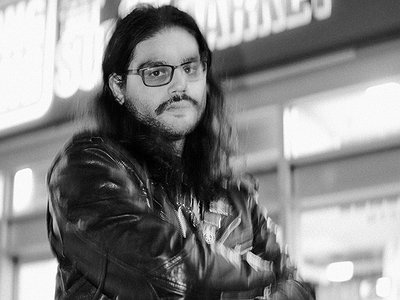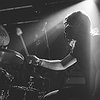Take us through a day in your life, from a possible morning routine through to your work, please. Do you have a fixed schedule? How do music and other aspects of your life feed back into each other - do you separate them or instead try to make them blend seamlessly?
The unfortunate reality of being a freelancer is that there is rarely a stable schedule. I’m always either rehearsing, performing or teaching, which all of course fluctuate in busyness. Projects come and go and vary in length, so it’s always different.
Thankfully, I’ve been getting a lot of work this year! Last week I was busy recording with Australian jazz pianist Andrea Keller for her upcoming free jazz/doom metal record.
I’m a huge night owl, so usually I’m most creative in the early hours of the morning. I usually work on music in the dead of night while the rest of the world is asleep. There’s something I really like about the stillness of working late, there’s no sounds from the outside world.
Can you talk about a breakthrough work, event or performance in your career? Why does it feel special to you? When, why and how did you start working on it, what were some of the motivations and ideas behind it?
Releasing my debut album, which happened very recently! The positive feedback I’ve received has been really lovely.
It initially came about from solo drum-kit recordings I did in my home studio during lockdown, and I then in Ableton created structures and soundscapes/sound collages to fit in with them. My friend and fellow half-Indonesian, Kristi Monfries (who runs arts projects like Volcanic Winds and the Instrument Builders Project) really helped me out and got me in touch with John at Important Records, and the rest is history!
There are many descriptions of the ideal state of mind for being creative. What is it like for you? What supports this ideal state of mind and what are distractions? Are there strategies to enter into this state more easily?
Knowing when you are doing too much in a project. It’s easy to get extremely invested in something and overcook it, where you stop making properly informed creative choices and start making choices that make no sense to the larger work.
I recently started working on music for my next record, and there was one track that I was getting close to seeing a semblance of a created work, but I was simply putting too much energy into it and I was beginning to become burnt out, so I’m currently leaving it alone for a month or so, til I forget about all of the intricacies of what I was going for and re-approach it with fresh ears.
I’m like that with any recordings of improvisations I do. I need to forget it first, before thinking about listening to it, otherwise I’ll be questioning what I was trying to do in the process.
Music and sounds can heal, but they can also hurt. Do you personally have experiences with either or both of these? Where do you personally see the biggest need and potential for music as a tool for healing?
I think it’s all about the intention.
A lot of my personal listening would be considered “extreme” music. Harsh noise, extreme metal, free jazz, modern classical etc. but despite its brutal sonic nature, I don’t think these musics are damaging or do they “hurt”. To the contrary it’s actually the opposite. I feel that a lot of extreme music is actually quite euphoric. There’s not much that can match the exuberant feeling of being at a grindcore show where the music is going incomprehensibly fast through a loud PA, and being in the middle of an audience who are losing their collective shit to it. It’s pure energy, moreover it’s a cathartic and healthy energy.
I’ve found that usually people who end up playing or attending performances of a lot of extreme music like noise and grindcore also end up being the loveliest people. Surely the cathartic craft of making said music would also factor into that.
There is a fine line between cultural exchange and appropriation. What are your thoughts on the limits of copying, using cultural signs and symbols and the cultural/social/gender specificity of art?
I think it all comes down to understanding, education, genuine engagement and respect. If you want to go down that road, you have to know what you’re actually dealing with and understand the history and culture surrounding it before even thinking of engaging. I’ve seen it fail spectacularly, but also be incredible when done correctly. The line is very fine and often blurry.
Our sense of hearing shares intriguing connections to other senses. From your experience, what are some of the most inspiring overlaps between different senses - and what do they tell us about the way our senses work?
I think that the overlap of senses would fall into how our brains encode data for memory through sensory processing. Usually, when I listen to a work of music for the second time or so, I find it difficult to remove the visual memory that accompanied the initial listening experience. For example, I distinctly remember listening to Steve Reich - Drumming for the first time on a bus on the way to school. Now that piece of music is forever associated with what I saw on that particular bus ride.
Of course there’s also artists that utilise the audio-visual relationship in a performative/exhibitive aspect to an amazing effect like Ryoji Ikeda, Robin Fox and Marco Fusinato, whose work speaks for itself! While on the topic, dance is another obvious but fundamentally important exploration of the audio-visual relationship.
The relationship between sound and touch is simply summed up in the beauty of loud sound systems and amplifiers. I think the reason why we play so loud in Whitehorse is because it's about the near-kinetic physicality of the air being pushed out of the amplifiers and feeling the vibrations of the air coursing around the physical space we are performing in.
Overlap of smell and taste to sound haven’t come to my mind (yet). Maybe the distinct smell of valves in amplifiers or smoke machines? The taste of cheap beer at a gig?
Art can be a purpose in its own right, but it can also directly feed back into everyday life, take on a social and political role and lead to more engagement. Can you describe your approach to art and being an artist?
I think being an artist is about finding meaning in things in this crazy world. For me, creating art and being an artist is what gives me meaning in my life, it’s my excuse for getting out of bed, leaving the house etc. 2020 with its lockdowns, lack of gigs, and the inability to play music with other human beings really highlighted that.
I have never really stopped to think about my approach or why I do what I do. It’s subconscious. That’s probably a really good thing to be honest.
What can music express about life and death which words alone may not?
Music doesn’t rely on written language to express and exchange ideas and emotions. Sure, most if not all specific musics require a thorough understanding of its vocabulary to have a deep and proper appreciation of (ei. chord/scale relationships in jazz), but broadly speaking, music is a universal form of communication across any society or culture, regardless of what language the lyrics might be, or intrinsic philosophies which that particular culture may follow.
In my own listening, some of the most emotionally moving and profound music has come from cultures that have nothing in common with mine, in languages that I cannot understand. I have definitely felt ecstasy, contemplation, despair, grief: all emotions that tie into life and death whilst listening to music from cultures far removed from my own.
Interviews / About
Fifteen Questions Interview with Rama Parwata
Collaborative DNA
Part 2

"When I listen to a work of music for the second time or so, I find it difficult to remove the visual memory that accompanied the initial listening experience. For example, I distinctly remember listening to Steve Reich - Drumming for the first time on a bus on the way to school. Now that piece of


